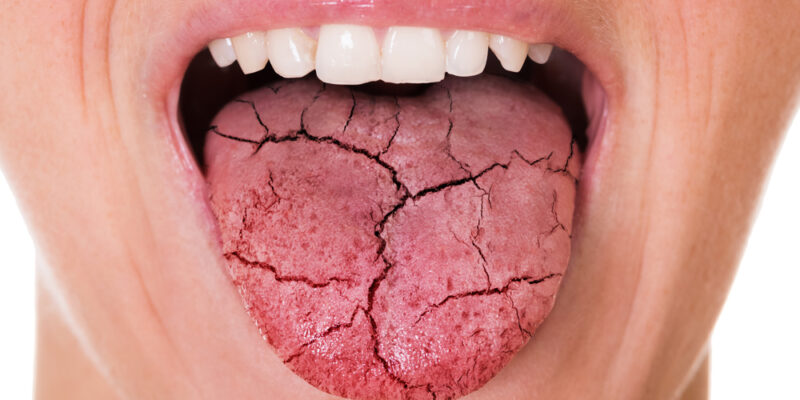In this article:
- Dry mouth can lead to tooth decay and gum disease
- Possible causes of dry mouth
- How to relieve dry mouth in South Jersey
The complaint of dry mouth – also called xerostomia – is often caused by a low flow of saliva. Saliva coats and moistens oral tissues. It cleanses your mouth and helps digest food as they are chewed. But, if you do not make enough saliva, harmful germs can grow in your mouth.
Having a dry mouth all of the time or most of the time can result from other health issues or the treatments for them.
Problems from Dry Mouth
Drying irritates the soft tissues in your mouth, which can make them sore and can lead to infections. Without good saliva flow to keep your mouth clean, tooth decay and oral infections become much more common. Constant dryness may lead to more cavities and bad breath. It can also lead to:
- trouble with tasting, swallowing, chewing or speaking
- burning feeling in our mouth
- dryness in your throat
- cracked lips
- dry and rough tongue
- mouth sores
Dry mouth can also make full denture less comfortable to wear and can cause sores. This is because there is no thin film of saliva to help dentures hold on well to oral tissues.
Causes of Dry Mouth
The most common cause of dry mouth is medications taken to treat other problems. Dry Mouth is a side effect of more than 500 prescriptions and over0the-counter medications. These include medications for:
- allergies
- colds
- pain
- high blood pressure
- depression
- asthma
Read the drug inserts that come with your medications. If you see dry mouth listed as a side effect, tell your dentist, hygienist or physician.
Dry mouth also can be caused by other factors. These can include:
- radiation treatment for head and neck cancers
- chemotherapy
- mouth breathing
- salivary gland disease
- Sjogren syndrome
- diabetes
- emotional stress
Dry Mouth Relief
Treatments for dry mouth will depend on the cause. In some cases, a change in medications you are taking may help. Your dentist or physician may suggest that you use a special gel or liquid (available at drugstores) to keep oral tissues moist. Drinking more fluids throughout the day can also help. Other ways to manage dry mouth include:
- chewing sugar-free gum or sucking on sugar-free hard candy to increase saliva flow
- sipping water often and with meals to moisten dry food
- sucking on ice chips during the day
- keeping the air moist with a humidifier at your bedside or other places in your home
- applying a lanolin-based oinment to dry lips
- using alcohol-free mouthwash
- avoiding alcohol
- avoiding all tobacco products
What should you do if you have dry mouth in South Jersey?
Regular dental checkups are important if you have dry mouth. Tell your dentist about the medicines you are taking and any health problems you are having.
Call us today at 856-829-8668 or contact us to schedule an appointment!
Copyright @ American Dental Association

